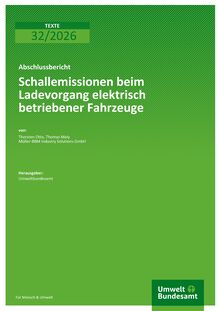
Schallemissionen beim Ladevorgang elektrisch betriebener Fahrzeuge
Texte / February 2026 / 60 pages

Man-made climate change is a global challenge. The core task is to reduce greenhouse gas emissions and offset unavoidable emissions. Timely, sustainable infrastructure investments are key to climate action success. The focus is on reducing energy demand and a complete switch of the electricity and heat supply to renewable energies, taking into account interplay with other environmental challenges. The German Environment Agency supports this process with strategies, scenarios, measures and instruments as well as monitoring activities. It also implements individual instruments, such as emissions trading, guarantees of origin for green electricity or the Blue Angel ecolabel.